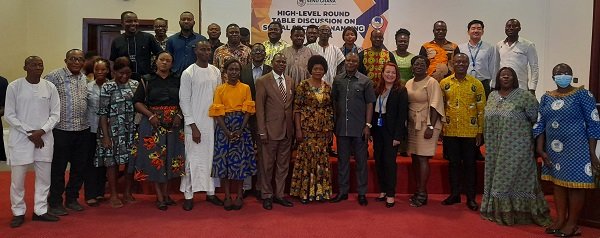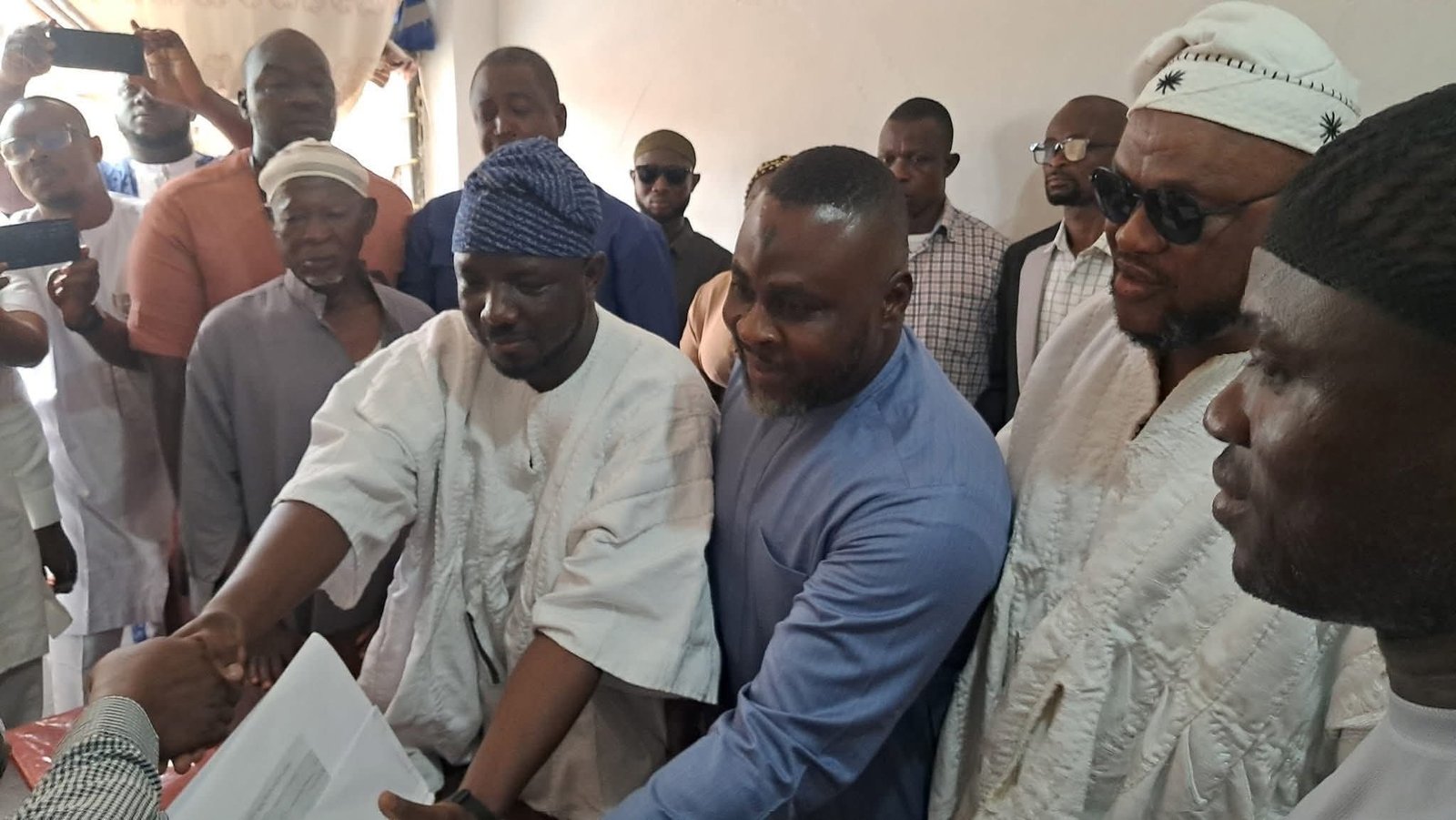Hot!
Stakeholders urge government: don’t cut funding to key sectors of economy

• The stakeholders
In spite of dwindling economic fortunes, the government has been urged not to cut expenditure on key sectors that seek to promote social and economic well-being of citizens.
Stakeholders say areas such as Education, Health, Water, Sanitation and Hygiene (WASH) as well as Child and Social Protection should continue to receive adequate funding, in view of current economic hardship.
This and other recommendations were the highlights of a discussion on ‘Social Protection Financing in Ghana’ organised by SEND Ghana and its partners in Accra last Friday.
A United Nations International Children’s (UNICEF) Report presented at the forum indicated that reduction in expenditure of important sectors of the economy may adversely affect the gains made in reducing poverty and attaining the Sustainable Development Goals (SDGs).
The report which made analysis and provided recommendations across five strategic sectors observed that budget allocation to the education sector had decreased from 15.74 per cent in 2020 to 13.11 per cent in 2022, and that 90 to 95 per cent of the allocations to the Ministry of Education went into payment of compensation of employees.
This scenario which is evident in other government Ministries Departments and Agencies (MDAs), according to UNICEF, would “negatively affect the delivery of social services, especially for women, children and the vulnerable.”
“Investing in children’s health, nutrition, sanitation, education and protection is important to unlock their potential and contribute positively to economic activities. The cost of inaction in these areas is enormous and cannot be overlooked,” it stated.
Stressing the need to secure social intervention policies, the report prompted the government to ensure “regular and timely” release of funds for social programmes such as the Livelihood Empowerment Against Poverty (LEAP) which had consistently experienced delay in payments.
The report established that though allocations for LEAP had seen “significant increases since 2017,” the value of the money paid to beneficiaries had reduced as a result of inflation, hence the need to adjust the payments accordingly.
In the health sector, it called for increase in total health budget as well as “investments that tackle the prevention and control of communicable diseases, neonatal health and adolescent reproductive health.”
While urging increased budget allocation to key sectors, it suggested “progressive revenue-raising policies,” to support social interventions and further proposed introduction of “a shock-responsive emergency fund to ensure that the government can respond quickly to emerging crises.”
Panelists at the forum, including Members of Parliament, Representatives of MDAs, Academia and Civil Society Organisations, maintained that government expenditure in areas such as social protection, education, health, among others, should be seen as an investment rather than waste of resources.
Mr Mawutor Ablo, Director, Ghana Productive Safety Net Project, Ministry of Gender and Social Protection (MOGSP), said equitable resource allocation to fundamental sectors of the economy would have positive impact on the citizenry and contribute to national development.
“Any money spent on the extremely poor and vulnerable is empowering them to become more productive so if we accept social protection as an investment we have to create the fiscal space for that to happen,” he noted.
Mr. Nii Lantey Vanderpuje, Member of Parliament for Odododiodo Constituency, also emphasised the need to increase funding for social protection and basic social services to help ease the economic burden on citizens.
Dr. Emmanuel Ayifah, Deputy Country Director, SEND Ghana, said the organisation would continue to engage the government and stakeholders on the issues raised which would be factored into the 2023 Budget and Economic Policy Statement of the government.
By Ernest Nutsugah
Hot!
Prof Alidu Seidu files nomination for Tamale Central seat

The newly elected parliamentary candidate of the National Democratic Congress (NDC) for Tamale Central, Prof Alidu Seidu, has submitted his nomination forms to the Electoral Commission.
As of 10:00 a.m. today, he was the only person who had filed to contest the seat.
Nomination of candidates will close at the end of the day.
Associate Professor and Head of the Political Science Department at the University of Ghana Legon, Prof. Alidu Seidu won the National Democratic Congress (NDC) parliamentary primaries in the Tamale Central constituency with a landslide victory.
The elections, supervised by the party’s Elections and IT Directorate in the Northern Region, saw Prof. Seidu poll 840 votes out of the total valid ballots cast.
His closest contender, Lawyer Hanan Gundadow Abdul-Rahaman, secured 536 votes.
The other aspirants could not make significant gains, with Dr. Seidu Fiter obtaining 44 votes, Aliu Abdul-Hamid 23 votes, and the rest recording fewer than 10 votes each.
In all, 1,500 ballots were cast, with 6 ballots rejected and 7 spoilt ballots recorded.
The results were signed and declared by Dr. Arnold Mashud Abukari, NDC Northern Regional Director of Elections and IT.
The National Democratic Congress (NDC) held parliamentary primaries in Tamale Central to choose a candidate for the upcoming by-election following the death of the sitting Member of Parliament, Dr. Ibrahim Murtala Mohammed. Dr. Mohammed, who also served as Minister for Environment, Science, Technology and Innovation, tragically died in a military helicopter crash in the Adansi Akrofuom District on August 6, 2025, alongside seven others.
His passing left the Tamale Central seat vacant, as required by Ghana’s 1992 Constitution.
The Electoral Commission has scheduled the by-election for September 30, 2025. While the NDC moved quickly to open nominations and vet aspirants, the New Patriotic Party (NPP) announced it would not contest the seat, citing the need to respect the somber circumstances and promote national unity.
By: Jacob Aggrey
Hot!
Ghana to locally refine its gold starting October 2025 – Sammy Gyamfi

The Chief Executive Officer of the Ghana Gold Board, Sammy Gyamfi, has announced that plans are far advanced for the establishment of a state-owned gold refinery in the country.
Speaking at the 2025 Minerals and Mining Convention, Mr Gyamfi said the refinery will process locally mined gold into bullion instead of exporting it in its raw state.
According to him, it is unacceptable that Ghana, despite being a leading gold producer in Africa, continues to export raw gold known as dore.
He explained that the Gold Board, working with the Bank of Ghana and local refineries, will from October 2025 begin refining gold locally.
He also disclosed that an ultramodern assay laboratory will be built to ensure international standards in testing gold quality.
Mr Gyamfi noted that the refinery will be wholly state-owned and will help Ghana move away from raw mineral exports to value addition.
This, he said, will boost foreign exchange earnings, create jobs, and position Ghana as a hub for gold refining and jewellery production in Africa.
The CEO stressed that the project forms part of government’s strategy to ensure the country benefits fully from its natural resources and to transform the mining sector into a driver of economic growth.
By: Jacob Aggrey






